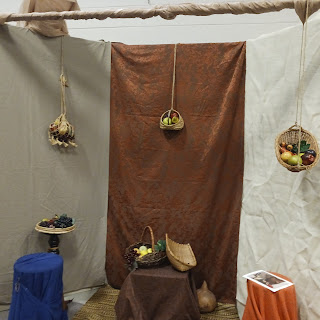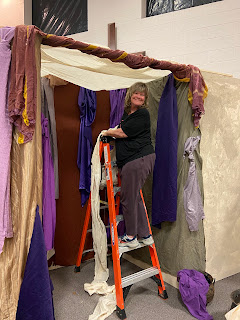I don't always do an end of year retrospective; some years I'm on vacation, while other years, I just don't feel like it. But today, reading the retrospectives of other people, I've decided to put one together. It's good to remember that there were good times and bad, goal met and not yet met and abandoned, books read, that kind of thing.
Teaching
Let me begin with teaching. I've continued to teach online and in person. I've had days when I thought, this is what I was put on earth to do! There were plenty of days when I wondered if I'm too old to do this anymore, but mainly because there are so many cultural references I'm not going to get. But my overarching feeling is that I am ready to step into my wise elder shoes--I'm much more assertive about forbidding cell phone use in class, much more willing to assert that some experiences are important (we will create a communal poem, we will describe a tree that we've spent 20 minutes observing, we will continue to assert the primacy of literature).
Seminary
I continued to take a wide variety of seminary classes in a wide variety of modalities. I am still really enjoying this work. In the past year, I took 9 classes, no small accomplishment, particularly in a year of a devastating storm that made life very difficult (no electricity for 2 weeks, no internet connectivity for 4 weeks) for an online student.
Writing
Much of my writing focus has been seminary work and writing a weekly sermon. It's been delightful, but there are times when I feel odd about how much poetry writing I haven't been doing, along with other writing. But I did write 30 poems of varying degrees of completeness, along with at least that many fragments. I have continued to blog daily throughout much of the year. I have kept an offline journal and sent e-mails to friends, along with letters. Writing is still one of the ways I figure out myself and the world.
Sketching
I have done some sketching on a daily basis. As I looked at my sketchbook, I'm struck by how I'm trying to capture the mountains in sketching, with varying degrees of success. I've written more about my year in sketching in this blog post.
Fabric Arts
I have continued to stitch, although there have been too many weeks in the Fall when I did not touch fabric. At the end of the year, I have a new quilt top almost completed, a quilt top I didn't even have in my head at the beginning of the year. I have loved being part of a group at the local Lutheran church that makes quilts for Lutheran World Relief.
Reading
I have done a lot of reading for seminary class, which means I haven't done as much other reading as I would like. I read at least 70 books, including some rigorous academic books outside of theology. I would like to read more poetry in 2025.
Theatre and Museums
We saw great theatre, but it was in our home, which may be one of the better ways to see it (it's cheaper, and we can see more). I went to one special exhibit at the Columbia Museum of Art, which I wrote about in this blog post. I also went to the Smithsonian, back when I was in DC for the seminary onground intensive, which I wrote about in this blog post.
Music
We had great musical experiences at camp during Music Week. We had plans to go to a concert or two, like the Violent Femmes, but Hurricane Helene disrupted those plans.
Health
I continue to work on solid practices that will situate me for an easier old age: more walking, more vegetables, more strength training, more gratitude, more creative time, more friends, less alcohol, less sweets, less screen time. Most months, I'm partially successful in most areas, and most of the time, I think that's about all I need to worry about.
Hurricane Helene
One of the things I will remember most about this year is Hurricane Helene, the fact that we moved 900 miles away from our South Florida house in a flood zone, only to be impacted so severely by hurricane remnants, from a hurricane that came ashore hours earlier and hundreds of miles to the south. We are 2000 feet above sea level, and the damage to the geography was much worse than any hurricane damage I've ever seen with my own eyes. Happily, our home was not damaged, and we did not lose a single tree.
Home Renovation
We made progress on home renovations. A year ago, we still didn't have much in the way of internal walls; now we do. A year ago, we didn't have any bathroom restoration done; now, we have two bathrooms that have been modernized. There is still work to be done, but there will always be work that needs to be done.
Politics and Other Major Events
The presidential election had lots of surprises, which shouldn't be a surprise. But I am guessing that in some future year when we look back, across a space of decades, we'll be surprised at what we all missed, what huge historical event we didn't see coming. If the more deadly form of bird flu mutates to become transmissible from human to human, that might be the story. If it's a war with China or that Putin detonates a nuclear bomb, that might be the story. Or maybe it will be an unexpected human rights advancement. I think about January of 1989 when no one would predict that this would be the year that the Berlin Wall came down and dictators across Eastern Europe would be deposed.













































